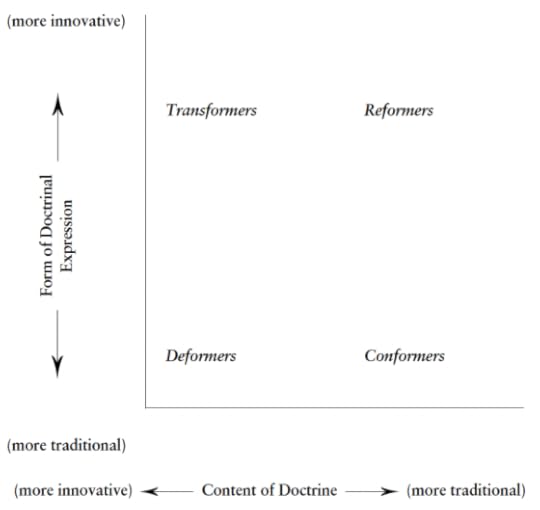Conformers, Transformers, Deformers, and Reformers
In his essay "On Flying in Theological Fog" Millard Erickson provides an interesting grid for classifying theologies:
It might be helpful to classify theologies along two continua: the degree of traditionalism (conservatism) and of innovation (liberalism) of the doctrinal position, and the degree of traditionalism and innovation of the form in which those doctrines are expressed. Although all labels are somewhat arbitrary, I'll illustrate with a matrix with two continua and four quadrants:
[Conformers]
On such a model, it is possible to maintain the traditional doctrinal positions and express them in the traditional form. Those who minister in this way would be conservative in both respects. They would not necessarily attempt to contextualize the message to make it understandable in different cultures and different times. These are what I have described as "non-dialogical," or "transplanters," or what David Clark has recently termed, "transporters," those who simply take a message from one "culture" and "transport" it to another without providing for adaptation. They conform to the originating culture. Examples of this can be found in surprising places. One noted American pastor and specialist in church growth is known for giving the message an accent familiar to the culture in which it is being ministered. He was invited to Germany to lecture on church growth and used his familiar example of the baseball diamond, in which one must first get to first base, then to second, then to third base, and finally, home. My friend who lived in Germany at the time remarked to me, however, "Germans don't play baseball!" It was the equivalent of an Englishman speaking to an American audience and using an illustration drawn from the sport of cricket.
[Transformers]
The "transformers" are those who do not merely modify the form of expression but also the content of the doctrine, generally because they do not believe there is a permanent doctrinal content.
[Deformers]
Those who revise the doctrinal content but express it in traditional fashion would be "deformers."
[Reformers]
On this model, the theology we hope to develop will be situated somewhere in the upper right quadrant, holding firmly to the doctrines clearly taught in Scripture, but finding creative and effective ways of expressing them.
Reclaiming the Center: Confronting Evangelical Accommodation in Postmodern Times, ed. Millard J. Erickson, Paul Kjoss Helseth, and Justin Taylor (Wheaton, IL: Crossway, pp. 346-347.
Justin Taylor's Blog
- Justin Taylor's profile
- 44 followers




